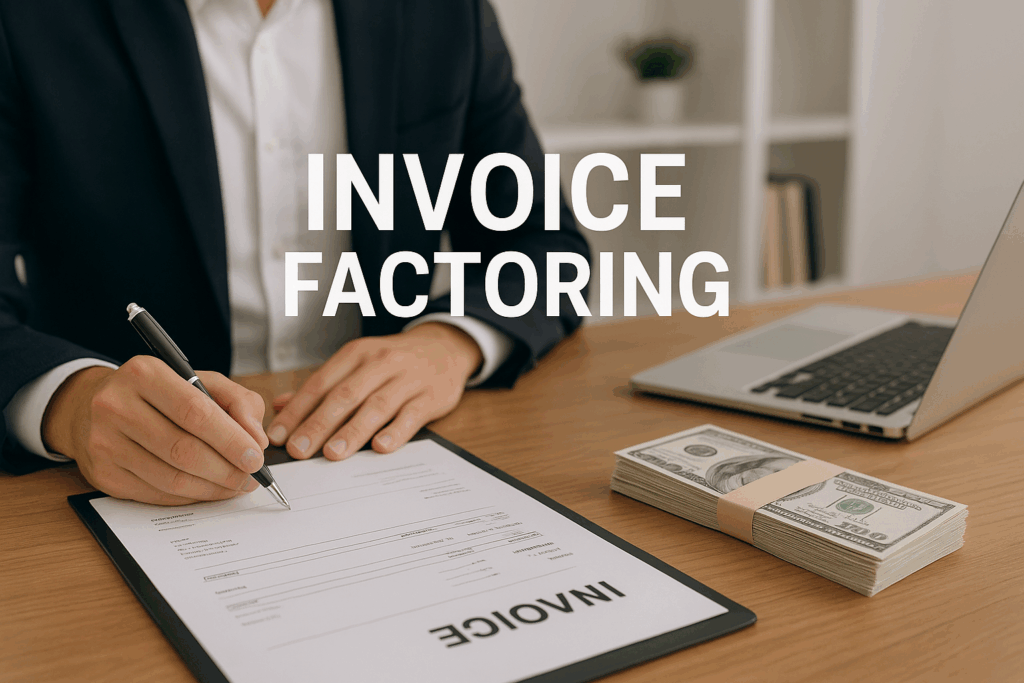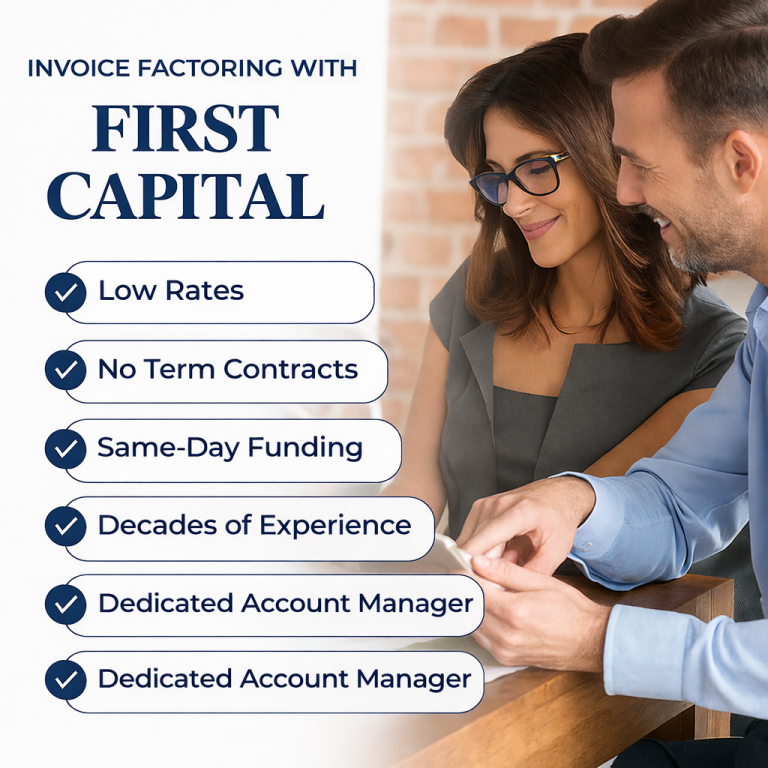Get Answers to Invoice Factoring Questions. Discover AR Funding Costs, Processes, and Benefits with First Capital.
Invoice Factoring Frequently Asked Questions
The following are frequently asked questions (FAQs) about invoice factoring services and how the factoring process works as it pertains to First Capital. If your business is new to accounts receivable factoring, you likely have questions about how the process works, what it costs, and how it can help improve your cash flow. Below are answers to the most common invoice factoring frequently asked questions to help you better understand the benefits of partnering with a factoring company like First Capital.
Invoice Factoring FAQs
1. What is accounts receivable factoring?
Accounts receivable factoring, also known as invoice factoring, is the sale of your unpaid invoices to a factoring company at a small discount.
Instead of waiting 30, 60, or even 90 days for your customers to pay, the factoring company advances you a large portion of the invoice value upfront—giving you immediate access to working capital.
2. How does factoring help my business?
Factoring helps businesses eliminate cash flow gaps by turning unpaid invoices into immediate cash. This funding allows you to pay bills, meet payroll, replenish inventory, purchase equipment, fund expansion, and increase profits—all without taking on debt.
By improving your cash flow, you gain the flexibility to manage operations more efficiently and take advantage of new business opportunities.

This entire process is designed to provide fast and reliable access to working capital.
3. How does AR funding work?
- 1. Apply with a factoring company by completing a short application.
- 2. Submit invoices for customers whose credit has been approved.
- 3. The factoring company advances you a set percentage—often between 80% and 95% of the invoice value.
- 4. Once your customer pays the invoice, the factoring company releases the remaining reserve balance, minus the small factoring fee.
4. How much does factoring cost?
Factoring fees typically range between 1% and 5% depending on factors such as your industry, the size and performance of your accounts, and your customers’ credit strength.
At First Capital, we make our terms clear upfront and can even suggest ways to help minimize your overall factoring costs.
6. What invoices qualify for funding?
Factoring applies to commercial invoices where your customer is another business (not an individual consumer). The product or service must be completed and accepted by the customer. The factoring company also verifies your customer’s creditworthiness, helping you avoid risky clients.
8. How long do I have to work with the Factor?
That depends on your needs. Some businesses use factoring services for just a few months, while others use them for years. Many companies continue factoring throughout the life of their business because it provides consistent, flexible access to working capital.
10. What if I have poor credit or no credit?
You can still qualify for invoice factoring. The approval decision is based primarily on the creditworthiness of your customers, not your personal or business credit score.
12. What happens if my customers don’t pay?
This depends on the type of factoring you choose:
Recourse factoring means you’re responsible for repaying or replacing any unpaid invoice.
Non-recourse factoring means the factoring company assumes the risk of nonpayment (under specific terms).
Your agreement will clearly outline which option applies.
14. What if the customer mails me the payment by accident?
This happens occasionally, especially at the start. If your customer accidentally mails payment to you, simply forward it to the factoring company without cashing it. This ensures all payments are properly tracked and applied.
16. What should I tell my customer? Will it look bad if I am factoring?
Most businesses are already familiar with factoring and see it as a smart cash flow strategy. You can simply explain that you’ve partnered with an outside company to manage receivables more efficiently. Many Fortune 500 companies use factoring as a standard financial tool.
5. How long does it take to get funded?
Setting up a factoring account usually takes 3 to 5 business days. Once your account is approved, advances are typically funded within 24 hours of invoice submission. That means your business can start enjoying faster cash flow in just a few days.
7. Can I just sell some of my invoices?
Yes! You can choose which invoices to factor. Many companies use selective or spot factoring to sell only specific invoices. As long as the invoices meet the factoring company’s criteria, you’re free to pick and choose which ones to fund.
9. How is factoring invoices different from a bank loan?
Factoring is not a loan—it’s the purchase of your accounts receivable. This means your business can access funding without taking on debt.
While banks make lending decisions based on your credit history and assets, factoring companies look at your customers’ credit strength. That’s why factors can often approve funding even when banks say “no.”
11. What if I have a bank loan or tax lien?
Many times, the factoring company can work with your bank or tax authority to subordinate their position or even help you pay down the debt using factoring proceeds. Just be upfront during the application process so the factor can structure the best solution for your situation.
13. Where do the payments get sent?
Your customers will send payments directly to the factoring company, which then applies the funds to your account and releases any remaining reserves to you.
15. How do I know my customers will be treated well?
A reputable factoring company—like First Capital—understands that your customers are vital to your business. We handle all communications professionally and courteously, ensuring your relationships remain strong. We’re not a collection agency; our goal is to help your business grow.
17. How can I get started with invoice factoring?
Getting started is easy. Complete a factoring application and provide basic documents such as:
Recent accounts receivable aging report
Business formation documents
Sample invoices
A list of your customers
Once submitted, our team will review your application and help you start receiving funding fast.
Invoice Factoring FAQs: Solutions For Small Businesses Nationwide
Types of Businesses We Factor
- Oil & Gas
- Staffing, Recruitment, Payroll
- Guard Services
- Construction (including Progress Billing and Paid when Paid)
- Government Contractors
- Transportation, Logistics, Automotive
- Real Estate Commissions
- Medical and Healthcare (No Medicare)
- Janitorial & Cleaning
- Telecom & Technology
- Agriculture
- Business Services
- Distributors and Manufacturers
Some States We Provide Texas Invoice Factoring
- Tennessee Factoring
- Kentucky Factoring
- Wyoming Factoring
- New Mexico Factoring
- North Dakota Factoring
- South Dakota Factoring
- Alabama Factoring
- North Carolina Factoring
- Virginia Factoring
- South Carolina Factoring
- Maryland Factoring
- Mississippi Factoring
We provide Factoring services in the State of Texas and most States Nationwide.
Have More Questions About Invoice Factoring FAQs?
At First Capital, we’re here to make the factoring process simple and transparent. Whether you’re new to invoice factoring or exploring better funding options, our experts can guide you every step of the way.

Contact Us about Invoice Factoring FAQs or your other questions. Request our FREE Guide To Factoring. Better yet, give us a call now. Let our team of factoring experts answer any questions you may have about invoice factoring. We can help you get started today. You’ll be glad you did.


